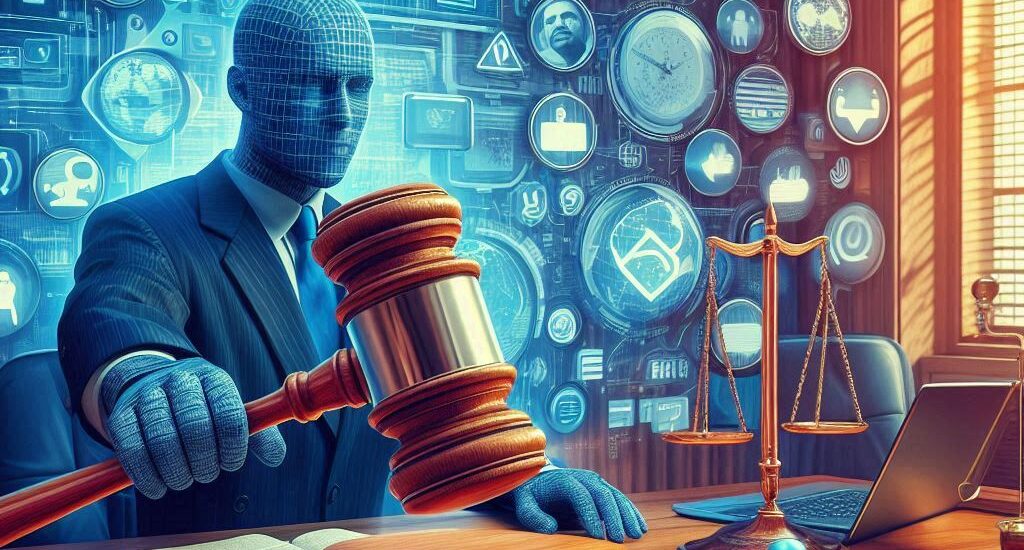



The rapid proliferation of social media platforms has reshaped global
communication and information dissemination paradigms. In India, as elsewhere,
the advent of social media has ushered in unprecedented opportunities alongside
daunting challenges. This article delves into the evolving landscape of social
media regulation within the Indian context, highlighting the urgent need for
robust legal frameworks to tackle the diverse issues stemming from its pervasive
use. It critically examines current Indian laws governing social media, evaluates
their efficacy in the digital era, and presents recommendations for comprehensive
regulatory measures aimed at safeguarding public interest while upholding
freedom of expression.
Introduction:
Social media platforms have become indispensable in contemporary society,
facilitating seamless communication, connectivity, and knowledge sharing. In
In India, the adoption of social media has skyrocketed, with platforms like
Facebook, Twitter, Instagram, and WhatsApp becoming integral to the daily lives
of millions. While these platforms enhance democratic discourse, societal
engagement, and economic opportunities, they also pose significant challenges,
including misinformation, hate speech, privacy breaches, and cyberbullying.
The legal framework governing social media in India is multifaceted but lacks
coherent guidelines tailored to the intricacies of digital communication. Current
laws, such as the Information Technology Act, 2000, and subsequent
amendments, primarily focus on electronic commerce and cybersecurity.
However, they inadequately address the nuanced complexities arising from social
media interactions, content moderation, and user responsibilities.
This article critically examines the deficiencies in existing legislation and
proposes strategic reforms to establish a more cohesive and effective regulatory
regime. Drawing insights from global best practices and real-life case studies, it
underscores the necessity for balanced laws that protect individual rights without
compromising innovation or infringing upon free speech.
The cornerstone legislation governing social media in India is the Information
Technology (IT) Act, 2000, amended in 2008, provides a foundational
framework for electronic governance and cybersecurity. While the IT Act defines
offenses related to unauthorized access, data theft, and cybercrimes, specific
provisions addressing social media platforms are limited.
Section 79 of the IT Act grants intermediaries, including social media platforms,
conditional immunity from liability for third-party content, contingent on
adherence to due diligence guidelines. However, ambiguities in interpreting these
guidelines often lead to controversies, particularly concerning content
moderation and user privacy.
Additionally, the recently enacted Personal Data Protection Bill, 2019, aims to
regulate the processing of personal data and establish norms for consent, storage,
and sharing. Despite addressing some aspects of social media usage, it does not
comprehensively cover issues such as fake news dissemination or online
harassment.
The unbridled dissemination of misinformation and hate speech on social media
platforms poses significant challenges to societal harmony and public discourse
in India. Instances of viral misinformation leading to communal tensions or
influencing democratic processes underscore the imperative for regulatory
intervention.
Furthermore, concerns regarding data privacy and protection persist, with
frequent instances of data breaches and unauthorized data sharing by social media
entities. The absence of stringent norms for data localization and user consent
exacerbates these issues, raising significant questions about accountability and
transparency.
Cyberbullying and online harassment have emerged as critical issues affecting
vulnerable populations, including women, minorities, and children. The
anonymity afforded by social media often emboldens perpetrators, presenting
challenges in holding them accountable under existing legal frameworks.
Nations worldwide grapple with similar challenges in regulating social media
while safeguarding fundamental rights. For instance, the European Union’s
General Data Protection Regulation (GDPR) sets rigorous standards for data
protection and privacy rights, significantly influencing global discussions on
digital governance.
In the United States, the Communications Decency Act (CDA) of 1996 provides
legal immunity to online platforms for user-generated content, emphasizing the
delicate balance between free speech and platform accountability. However,
ongoing debates surrounding Section 230 of the CDA highlight persistent
tensions regarding content moderation and platform responsibility.
1. WhatsApp Controversies: In 2018, WhatsApp faced scrutiny in India following
incidents of mob violence triggered by false rumors spread through the platform.
The Indian government urged WhatsApp to implement measures to curb
misinformation, resulting in initiatives like limiting message forwarding and
promoting fact-checking.
2. Twitter and Legal Challenges: Twitter has encountered legal challenges in India
concerning compliance with local laws, including content removal requests and
data localization norms. Instances of government scrutiny regarding platform
neutrality and accountability underscore the complexities of international social
media regulation.
3. Facebook and Cambridge Analytica Scandal: The global fallout from the
The Cambridge Analytica scandal highlighted vulnerabilities in data privacy practices
on social media platforms. The incident spurred calls for enhanced regulatory
oversight and accountability measures for data-centric businesses.
To address the multifaceted challenges posed by social media, the Indian legal
the system should consider the following recommendations:
1. Enactment of Comprehensive Legislation: Introduce a dedicated Social Media
Regulation Act to establish precise guidelines on content moderation, data
protection, and platform accountability, reflecting the unique dynamics of digital
communication.
2. Strengthen Oversight Mechanisms: Empower regulatory bodies like the
Ministry of Electronics and Information Technology (MeitY) to monitor
compliance with regulatory norms and swiftly address emerging threats.
3. Promote Digital Literacy Initiatives: Invest in public education campaigns to
enhance digital literacy and promote responsible social media usage, especially
among vulnerable groups susceptible to misinformation and online harassment.
4. Enhance International Collaboration: Foster partnerships with global
stakeholders to exchange best practices and develop standardized norms for
effective social media regulation, while respecting cultural and regional
specificities.
The rapid evolution of social media platforms has revolutionized communication
dynamics in India, presenting unprecedented opportunities alongside significant
challenges. While current legal frameworks provide foundational support, they
fall short of addressing the nuanced complexities of digital governance. By
advocating for strategic reforms and comprehensive legislation, India can foster
a regulatory environment that safeguards individual rights, promotes digital
innovation, and upholds democratic values in the digital age. Embracing a
balanced approach that respects freedom of expression while ensuring platform
accountability is crucial to harnessing the full potential of social media as a
catalyst for positive societal transformation.